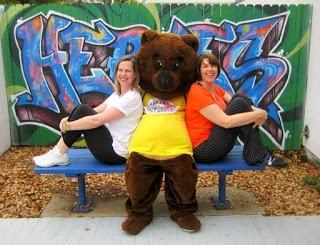
Butterfly by Melina Meza
Two of our readers, Susan Reeves and Pam Ryan, are co-founders and teachers at Yoga Bridge - Yoga for Cancer in Denton, Texas. When they offered to interview one of their students for the blog about her personal experience practicing yoga as a cancer survivor, we jumped at the chance. The student they chose to interview was Judie Craven, RN, who, as both a nurse and a breast cancer survivor, has a special perspective. —NinaSusan/Pam: Why don't you start by telling us a bit about yourself, Judie.
Judie: I've worked in the medical field for over 23 years in all clinical aspects of nursing: oncology nurse, physician's nurse, medical nurse, radiation nurse, and now as a practice administrator. I also work to promote awareness and raise funds for breast cancer research and patient support with other organizations in my community.
In the fall of 2009 I was diagnosed with early stage breast cancer, which was found on a routine mammogram. I recall sitting in my car in the parking lot of my doctor’s office when I got the call that my biopsy was positive. Here I was, three months after the traumatic end of my 30-year marriage, alone and hearing that I had breast cancer. It was surreal. I thought, “God, why me?” Then I realized that I thought I knew what it was like to hear those words (by that time I had treated thousands of cancer patients at my facility), but my understanding pre-diagnosis wasn’t even close to this new reality.
Susan/Pam: So why did you start practicing yoga and how have you found it personally helpful?
Judie: I started with the Yoga Bridge group in 2012. I decided to attend the class because I thought to myself, "These nice ladies are donating their time. I am a cancer survivor so I should go to set a good example for my patients and staff." Little did I realize how this program would enrich my life! I was immediately embraced by a group of compassionate, understanding friends who knew exactly how I felt and we quickly became a source of support for each other, forming sincere and supportive friendships. Even surrounded by your own family and friends, cancer is a lonely disease that can leave you feeling that you have failed and/or that your body has failed you. To be among your peers is comforting beyond description.
Susan/Pam: How about the yoga asanas—do you have a favorite pose that you've found particularly helpful?
Judie: Downward-Facing Dog. My job can be pretty stressful! Down Dog helps to release tension better than any other pose for me. It stretches my whole body and makes me feel strong—like I can accomplish anything.
Susan/Pam: That pose is a great choice for someone who has returned to full health after a diagnosis. So, have there been any challenges in your yoga practice because of your cancer diagnosis or treatment?
Judie: One issue I had was scar tissue at my surgery site—I had some limitations with movement there. My teachers at Yoga Bridge taught me specific movements and stretches that helped improve my range of motion. I previously tried yoga classes at my gym, but Yoga Bridge offers smaller classes and assistant teachers who are knowledgeable enough to help students customize postures to their specific needs. That way, everyone has a successful practice.
Susan/Pam: In general, why do you think yoga is such a good fit for someone with cancer?
Judie: One of the most important things a cancer patient can do is learn to manage their energy levels. For many, the diagnosis and treatments can cause extreme levels of fatigue. In general, exercise can greatly help to manage that. What sets yoga apart is that you can go at your own pace and choose from a seemingly never-ending list of exercises for the mind and body. Once you’re taught how to modify, you can adapt according to your own level of energy in almost any class,. Yoga is a good overall fitness plan for both those who need something gentle and also for those who are ready to rebuild strength and balance.
I've also noticed how yoga helps with my own stress levels. It makes me feel grounded and centered, and I sleep better. It works for many of my patients, too. Linda has been in and out of treatment for metastatic breast cancer for almost nine years. She says yoga gives her “me” time to meditate and relax through rhythmic breathing, stretching, smooth flowing poses and Savasana, which let her body rest and be in a calm state for 75 minutes. Away from the family, appointments, errands, the endless to-do list, intrusive stressful and often depressive thoughts, she finally can be one with the space she is in. It can be a very spiritual experience.
The breathing exercises are tools we can use to calm or energize ourselves inside and outside of class, especially simple techniques like even count breath or mental alternate nostril breath. It’s usually the first thing new students latch onto. They come to class and tell how they were able to make it through scans, lab visits, and infusions with remarkably greater ease. These are easy exercises to remember and can be done anywhere at any time. Combining breath with wonderful guided imagery meditations is a special treat. Over the last three years I have been able to observe my progress by recognizing I am better able to quiet my normally very busy mind. Amazing.
I also love Nadi Shodhana at the beginning of hatha class. At first I was a little anxious when retaining my breath, but my stamina increased, as did my overall energy level. It’s so invigorating!
Personally I enjoy both hatha and restorative classes; however, restorative yoga is particularly appropriate for patients as they go through chemo and radiation. It's so gentle and accessible. It allows a person to be still and quiet the anxious mind while stretching and supporting the tender in-treatment body.
Susan/Pam: As yoga teachers, we’ve noticed that, at first, many of our students are afraid to practice yoga—they don't think they are flexible enough, physically strong enough...many reasons. What would you tell someone with a recent cancer diagnosis about Yoga for Cancer classes?
Judie: I think that most people have not been exposed to this type of yoga. My own first experience was in a local health club and, although I consider myself to be physically fit, I was completely lost! It seemed everyone around me already knew what to do and I was so intimidated. But with smaller classes and specially trained teachers, I’ve learned how and when to modify poses, and I know that yoga can accommodate anyone, no matter their fitness level, with or without a cancer diagnosis. It's important to find the right teacher who knows specifically how cancer diagnosis and treatment changes the mind and body. I recommend looking for teachers who have had specialized training in yoga for cancer and restorative yoga, as well as someone who focuses on breathing exercises and meditation. Smaller classes are crucial, too.
Susan/Pam: For yoga teachers out there, can you tell us how to approach the medical community about teaching a class for their patients?
Judie: You need to impress upon the medical community that yoga designed specifically for the cancer patient is safe. Focus on all the benefits it provides: stress reduction, community, strength, and confidence. Explain how it is taught with modifications to the standard poses to fit the individual.
Susan/Pam: Judie, thank you so much for sharing your story. You are such a positive force and we especially appreciate your candor. It is our hope that your words will inspire people with cancer to reach out and find the yoga community that is ready and willing to support them.

Subscribe to Yoga for Healthy Aging by Email ° Follow Yoga for Healthy Aging on Facebook ° Join this site with Google Friend Connect

